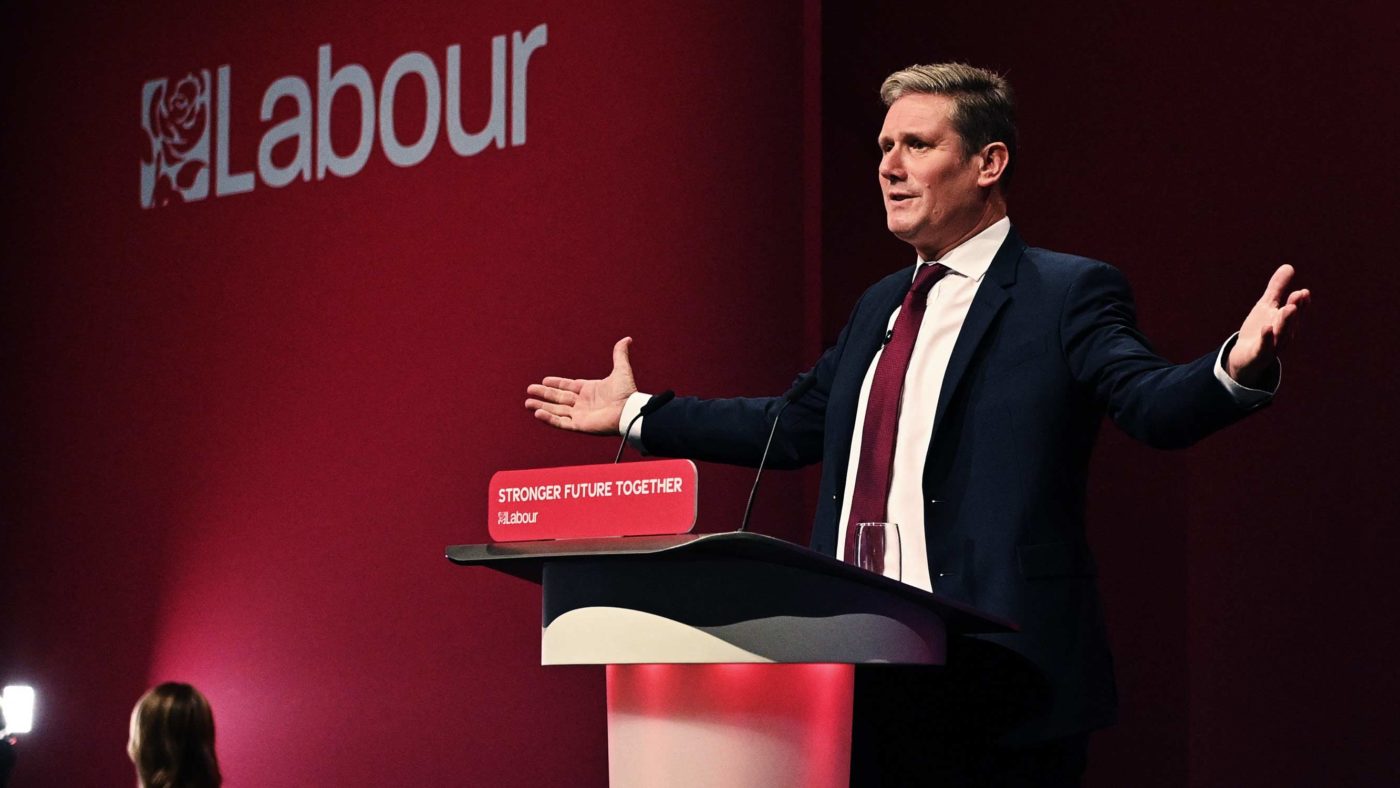The problem wasn’t that Keir Starmer’s conference speech was long and boring, exactly. We’ve all watched much shorter speeches that were far duller. Nor was it that Starmer is a stilted, rather unnatural orator who often felt like he was trying too hard to say weighty impactful things – that’s par for the course with politicians.
No, the biggest problem with Starmer’s speech was that even after almost 90 minutes, it wasn’t really clear what he had been trying to say.
That wasn’t for want of ideas for a unifying theme. Indeed, he tried quite a few – the ‘this is who I am’ life story theme; the ‘pandemic changed everything’ new political economy theme; the ‘Labour is about government not internal squabbling’ theme (this one was dramatised by Starmer calmly facing down constant heckling from his party’s infant wing).
At one point he listed ‘work, care, equality, security’ as the things he and his party stand for. But if he wanted that to be the motif of the speech, why did he barely revisit it?
It was as though the Labour leader had decided that here, finally, was a chance to say as much as possible, so by gosh he was going to say it. The problem is, if you try to major on everything, it’s not clear what your priorities really are. Indeed, this felt less an impassioned ‘here I am’ introduction to the public than a live version of his recent 11,500 word pamphlet, with a few jokes thrown in for good measure.
That’s a pity for Starmer, as there was a pretty good speech buried within this meandering, mediocre one.
He told a compelling story about his upbringing and why he is in politics, and the section about his mother’s illness and eventual death would have moved even the most cynical observer. Likewise, his words on his father’s pride in his work as a toolmaker struck a dignified tone after a conference that has been characterised by childish partisan bickering.
But rather than taking that personal story about who he is and why he’s in politics to tell a broader story about the country he wants to lead, the speech quickly dissolved into a wish-list of policies punctuated by one-line slogans that didn’t so much tie the speech together as separate out its different parts.
That’s not to say the individual sections were all bad. An opening salvo on crime, drawing on his own experience working with victims as Director for Public Prosecutions, struck a serious, convincing note on an issue that exercises a great many voters.
However, as with the section on his family, the power of what he said about his professional background was diluted by both the length and lack of focus that followed. So we ended up with a bit on crime, a bit on education, a bit on the NHS, a bit on the economy/business and another on climate change, each one making what came before more difficult to recall.
Some will argue that in modern, social media-driven politics, that doesn’t matter. The news channels will just clip up a few bits of the speech and that’s all most people will see. But even our finest digital alchemists would struggle to turn that 90 minutes into a punchy, crisp five minute package, because there wasn’t a punchy or crisp message to start off with.
Instead we got a fairly random-sounding assortment of policy announcements – quicker mental health appointments, tougher sentences for rapists, lower taxes on ‘working people’, a National Excellence Programme to improve education – many of which sounded like something Tony Blair could have announced. And in case anyone missed the tribute, Starmer quipped that ‘education is so important, I’m tempted to say it three times’.
None of these sounded especially objectionable, but nor did they exactly fire the imagination or offer a markedly different vision for the country. Indeed, perhaps the biggest problem is that you could quite easily imagine Boris Johnson adopting any of these policies as his own.
Other announcements ranged from a hand-wavey pledge to massively boost in R&D funding to an ‘Office for Value For Money’ to scrutinise public spending, as if the thing this country needed more of was nebulously titled office-holders marking the state’s homework (and isn’t that what the National Audit Office does anyway?).
The commentariat seemed to have collectively decided that this speech was a pivotal moment for Starmer, that he had to produce a barnstorming performance to seize the initiative. I didn’t really share that view. Journalists may love the idea of the crucial moment, Neil Kinnock’s premature triumphalism, Bob Dole stumbling down stairs, Theresa May’s ‘nothing has changed’ – but those moments normally crystallise something the electorate already felt about a politician or policy.
By the same token, a public who largely see Keir Starmer as a worthy, dull politician are not likely to have their minds radically changed by a speech the vast majority of them won’t have even watched. In any case, inspirational and barnstorming are overrated. The really important thing for a conference speech, especially for the leader of the opposition, is to pass the ‘Ru Paul test’ – don’t f*ck it up. On that note, at least, Starmer can be happy with his day’s work – but next time, can he please keep it under an hour…
Click here to subscribe to our daily briefing – the best pieces from CapX and across the web.
CapX depends on the generosity of its readers. If you value what we do, please consider making a donation.


